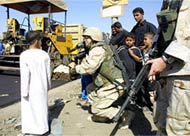US forces are their own worst enemy
A little Iraqi girl – no more than eight years old – squatted beside the road with tears of humiliation streaming down her cheeks.

Twenty feet away, three American soldiers had their rifles aimed at her as she was forced to relieve herself in full view of a long line of parked cars.
From inside their vehicles, the Iraqi onlookers screamed their rage at the US troops. Whenever one the Iraqis ventured to step out of his vehicle, an American officer bellowed, “Get back in the car, asshole!”
The .50 calibre machine gun mounted on the US Hummer would swing menacingly towards the protester. The terrified little girl was weeping uncontrollably by the time she dropped her skirt and ran back to her mother.
Her understandably enraged father began working his horn, and other Iraqi drivers quickly took up the protest by doing the same. The Americans laughed as they drove off, their weapons still trained on the Iraqi vehicles.
|
‘Get back in the car ass-hole’ US Lt Fisher – 101 Airborne Division |
Weapons search
This incident took place on Sunday, September 14, after a detachment of the US 101st Airborne Division set up a roadblock on the Samara-Kirkuk highway.
The purpose was to conduct a thorough weapons search of all traffic along this route.
However, without enough personnel to man the roadblock, cars and trucks were soon backed up for at least two kilometers in each direction.
The afternoon temperatures were over 40 degrees Celsius and there was not a bit of shade on that desert stretch of highway.
Verbal abuse
As part of their operational doctrine, the Americans did not allow anyone to step out of their vehicles until they had been searched, despite the fact that the waiting time at the roadblock was upwards of four hours.
To ensure that no Iraqi ventured onto the roadway, First Lieutenant Fisher and his detachment would race up and down the queue, pointing their weapons and hurling verbal abuse at any violator.
The little girl had been sitting in a small Mazda with six other family members for over three hours before she left the car.
Her older brother – no more than 10 – had bravely taken her by the hand and attempted to reach a small depression in the sand which might have offered a modicum of privacy.
 |
|
US soldiers, losing the hearts and |
Lt Fisher’s Hummer had roared down the unpaved shoulder and braked to a halt in a cloud of dust. The young boy abandoned his sister, who had no choice but to squat where she was.
While Fisher and his men may have carried out their orders efficiently, their aggressive behaviour and lack of empathy in this instance had done little to win over the “hearts and minds” of the Iraqi people.
Although it has been nearly five months since President George Bush proclaimed the war in Iraq to be over, the US forces continue to come under attack on a daily basis.
Three ambushes
More alarming is the fact that the attacks are no longer limited to the central Iraq region known as the “Sunni Triangle.”
Last week alone, there were three separate ambushes in the northern city of Mosul – one of which claimed the lives of five Albanian soldiers serving with the coalition forces.
“It is believed that many of the Saddam loyalists have been pushed out of the Sunni Triangle by the US military crackdown, so now they are plying their trade in the less protected areas,” said Eddie Calis – a.k.a. “Wind-talker” – the head of US security at the Kirkuk airfield.
As one of the few Arabic speaking US operatives in Iraq, “Wind-talker” is on call 24 hours a day. “We have no shortage of people who want to volunteer information – everything from Saddam’s whereabouts, to direct knowledge about possible attacks against our base,” he said.
Based on such tip-offs, US military personnel have conducted numerous raids to arrest individuals suspected of being Saddam fedayeen (loyalists).
“The suspects are brought to the Kirkuk airfield where they are interrogated for a period of up to 20 days,” said Calis. “At that time, they are either charged or released.”
Guantanamo Bay
Those facing charges are then transferred to Tikrit where they are tried before a US tribunal. If convicted, they are either incarcerated in Baghdad or Guantanamo Bay, Cuba, depending on the severity of the crime.
“The big problem is that a lot of the accusations we receive stem from personal hatred of an individual, rather than concrete evidence,” said Calis.
“When family members protest the arrests, the Iraqi police – who are terrified of reprisals against their own families – want us to arrest the protester!”
The 20 day detention period – in which outside contact is denied the accused – has also led to numerous rumours of US torture and abuse.
In Baghdad, Ghazwan – a former medical officer with Saddam’s regime – flogs such stories to the foreign media. Journalists are told that a torture victim is ready to tell his tale at a Baghdad hospital.
Public humiliation
However, when they arrive to interview him, the patient’s bed is empty. Ghazwan explains that he has been released “in order to die peacefully in his home.”
Although the victim is missing, his family members are curiously in attendance to attest to the allegations of torture. While such clumsy propaganda ruses have not been played up in the western media, the local Iraqi newspapers are full of uncorroborated accounts of human rights abuses.
Unfortunately, for those US civil and military officials who are trying desperately to win the peace in Iraq, the rumours are given credibility by such incidents as American paratroopers publicly humiliating and threatening a little girl.